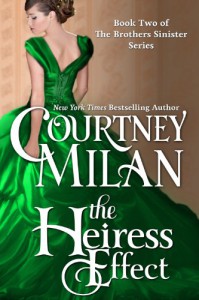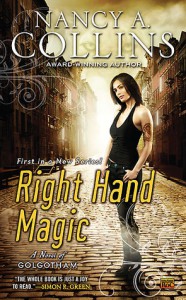
Synopsis:“Never before had so much money been put in the service of so little taste.”Jane Fairfield is trying on a new dress. She knows she looks utterly ridiculous but she has no choice – that’s the way it has to be. Her hideous, expensive, ghastly attires, overflowing with lace and silk of any imaginable kind, are her only armour against the polite society. She must drive away any potential marriage candidate while pretending she is actively looking for a husband – no mean task when you are young, fresh and you have one hundred thousand pounds of dowry.Still the happiness and well-being of Jane’s sister Emily, is at stake so Jane will go to any lengths to achieve her goal. Four hundred and eighty days – that’s how long she must endure, attending parties, spouting the most stupid, the most cheeky nonsense she can think of to practically everybody and bear the consequences. Everybody around calls her the Feather Heiress; they joke about her poor taste, brainless head and giggle behind their fans and tumblers when she opens her mouth. It doesn’t matter. Being dreadful is such a wearing work but she is prepared to suffer it to the bitter end.Everything is going exactly according to her plan until she meets Olivier Marshall, an illegitimate son of a duke, a very ambitious young man, a future politician and possibly also a prime minister. She takes him for a servant. And then insults him some more, calling him ‘common’. And then she insults his father. Such a grave mistake but at that time Jane was unaware of the consequences of treating Olivier as if he was just a headless aristocrat. Will she manage to fend off Mr. Marshall like her other suitors – with brainless talk, horrible dresses and a complete lack of manners? Never trust a politician – that’s how I’ll end my synopsis. If you want to know more you must read this novel. ;pMy impressions:Once again Courtney Milan proved that when it comes to challenging Victorian romance clichés she has no equals. In this novel you have your ordinary uncouth heiress who is invited to the parties only because she is filthy rich. However our heroine, not as stupid as everybody would like to believe, has her own secret agenda: she can’t marry for the sake of her beloved younger sister. She must fool her uncle Titus who would love nothing more than to get rid of tempestuous Jane for good. She must endure endless jokes and derision.It worked surprisingly well, allowing Ms. Milan to add several deliciously funny scenes during which Jane, looking as if butter wouldn’t melt in her mouth, was offending in public everybody around her. Not to mention the fact that she deliberately dressed as if she wanted to test the sense of sight and colour recognition of all the present guests at the same time. Who would like such a wife: not only stupid and socially inept but also with a complete lack of any sense of colour coordination? And here I hit the first little snag because I believe plenty of men would gladly close their eyes, plug their ears and pocket both one hundred thousand pounds and their owner, no matter how uncouth or stupid she was. Add to that the fact that Jane was rather curvaceous and pretty and I believe her little ruse wouldn't work in real world at all, not even for a month, let alone for over a year. I bet a clever gentleman would outmaneuver her in no time, using the old, stupid Titus as a bait.Now we get Mr. Olivier Marshall who, despite being an illegitimate son of a duke, wants to make a career in politics. He is of course aware of his disadvantages; he also knows that the right wife might help his prospects a lot. Unfortunately, he falls for our heiress, admiring her stamina, wits and stubbornness. Once again, the romantic cliché of a strong male delivering a weaker female from dire straits, social or otherwise, was inverted here: firstly Jane didn’t need delivering, not really, secondly she actually provided greater assistance to Olivier than the other way round. And, surprise, surprise, soon enough the gentleman got scared off because he’d never envisioned somebody as assertive and colourful in his life. He wanted a wren and he got a phoenix. What’s more, a darker, more opportunistic part of his nature was whispering in his ear dangerous ideas: perhaps the foolish heiress could be used to his advantage after all; she had trod on too many toes. If only he could persuade his conscience there is nothing wrong with humiliating her a bit so she stops pestering his aristocratic friends with her inanities. I liked that aspect of Olivier’s personality very much but, unfortunately, it wasn’t developed properly. Eh, the woes of romance fiction...The secondary characters I liked the best. The love story between Emily, Jane’s little sister, and a certain Hindu student of law was unexpectedly sweet. Emily was an avid reader of popular adventure series penned by a woman which also sounded very original. Sebastian Malheur and Violet reappeared again and made me curious about their relationship to say the least of it (I try hard not to spoil you here so bear with me).As I already mentioned Emily and her interracial affair...it made me do some research concerning the actual status of Hindu-English marriages in Victorian times and, although I agree it was completely possible, I have to say it sounded a bit unreal. Let me quote a fragment from a very interesting article (which can be found here) written by William Dalrymple who presented the results of his own (much more professional) research concerning that topic:“This period of intermixing did not last: the rise of the Victorian Evangelicals in the 1830s and 40s slowly killed off the intermingling of Indian and British ideas, religions and ways of life. The wills written by dying East India Company servants show that the practice of marrying or cohabiting with Indian bibis quickly began to decline: from turning up in one-in-three wills between 1780 and 1785, they are present in only one-in-four between 1805 and 1810. By 1830, it is one-in-six; by the middle of the century, they have all but disappeared. Biographies and memoirs of prominent 18th-century British Indian worthies that mentioned their Indian wives were re-edited in the mid-19th century so that the consorts were removed from later editions. The mutiny of 1857 merely finished off the process. Afterwards, nothing could ever be as it was. With the British victory, and the genocidal spate of hangings and executions that followed, the entire top rank of the Mughal elite was swept away and British culture was unapologetically imposed on India.”The Heiress Effect is set clearly after the Indian Rebellion of 1857 also known as the sepoy mutiny, so you can assess on your own the probability of an Indian-English marriage in India, let alone in London. Of course it is not a historical book, just my inner nerd had to be appeased. ;pFinally the ending. I know, I know, romance and HEA are like a horse and carriage or rather like petrol and a car – virtually inseparable. Still the HEA in this one was, again, a tad too rushed and too perfect, at least in my opinion. We were never shown the struggle of adjusting and readjusting of any of the young couples. Pity.Final verdict:I liked this one more than The Duchess War but less than some of the Turner series novels which were simply brilliant. Overall I of course recommend it but I do hope the next part will be even better. I know it can be so.One more remark.I want to use this opportunity to emphasize the fact that Courtney Milan is an author who appreciates both positive and negative reviews so if you don't like her book you don't have to be afraid that you might be attacked by her/her friends online for your cheek. What's more she encourages sharing her novels with friends, often publishing them without DRM. I really appreciate both approaches - thank you Ms. Milan for a bit of normalcy!

 1
1


 2
2















